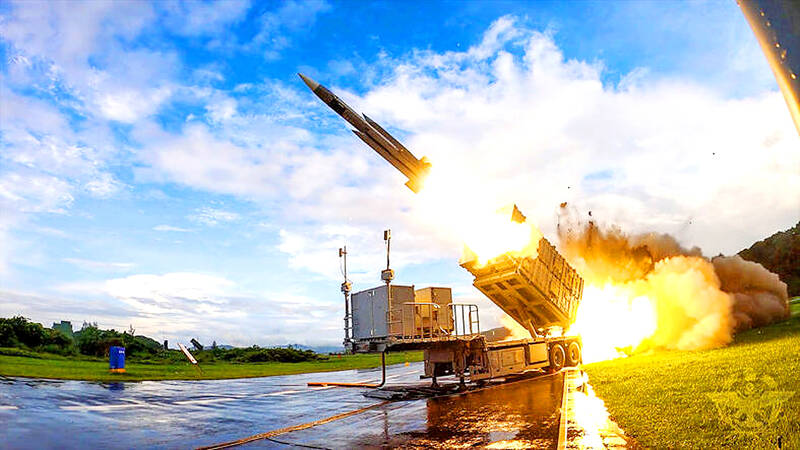The armed forces are to set up the Republic of China Navy Sea Control Missile Command in Yunlin County’s Huwei Township (虎尾) by the end of the year, a defense official said yesterday.
The command would be headed by a rear admiral instead of a captain, underscoring the expanding size and importance of the navy’s anti-ship missile forces, the official said, speaking on condition of anonymity.
The headquarters would be comprised of administrative buildings and barracks, but no missile depot, which would be built elsewhere, due to opposition from local residents who did not want the base to be a potential target for strikes should China attack, the official said.

Photo: EPA-EFE / Ministry of National Defense
In November last year, Vice Premier Cheng Wen-tsan (鄭文燦) told a gathering of civic leaders in Yunlin County that President Tsai Ing-wen (蔡英文) and Premier Chen Chien-jen (陳建仁) resolved to remove the missile depot after consulting with defense officials.
That decision aligns with the armed forces’ strategy for mobile air and coastal defense missile forces, which emphasizes mobility and vehicle-mounted missile launcher platforms over fixed-position defenses, the source said.
Taiwan is slated to receive 100 Harpoon Coastal Defense System Launcher Transporter Units and 400 Harpoon missiles from the US to augment the domestically produced Hsiung Feng line of missiles in the coastal defense mission, they said.
Previously, the navy’s Hai Feng Shore Based Anti-ship Missile Group controlled all anti-ship missile forces, which consisted of six fixed-launcher squadrons, four mobile squadrons and one support squadron.
An increase in equipment and personnel necessitated the creation of additional mobile squadrons that could not be efficiently controlled by a group-sized headquarters, the official said.
The Sea Control Missile Command is to control the existing forces, now designated as the First Hai Feng Shore Based Anti-ship Missile Group, and new groups of fresh mobile missile squadrons, they said.
The command last year quietly activated its second missile forces group headquartered in Taichung’s Cingshui District (清水) while a third missile forces group is to be activated by the middle of this year, they said.
Meanwhile, the military is poised to launch a surge in production of anti-ship missiles over the next two years in response to the threat posed by Chinese warships and aircraft, Ministry of National Defense sources said.
The production surge is aimed at increasing the manufacturing scale of Hsiung Feng II and Hsiung Feng III missile systems, they said.
The extended-range version of the Hsiung Feng II missiles increased the system’s effective range from 148km to an estimated 160km to 200km, and also feature improved maneuverability and anti-electronic warfare capabilities on par with Western designs, they said.
Hsiung Feng III missiles have an optimal engagement range of 150km to 200km, while the extended-range version has an effective range of 400km, the sources said.
The deployment of Hsiung Feng III missiles and the extend-range variants would greatly enhance the navy’s ability to defend the seas to Taiwan’s northern, eastern and southern areas, they said.
The ministry is also seeking to augment the mobility of the Hsiung Feng missile systems by fielding more mobile launch vehicles, sources said.

DAREDEVIL: Honnold said it had always been a dream of his to climb Taipei 101, while a Netflix producer said the skyscraper was ‘a real icon of this country’ US climber Alex Honnold yesterday took on Taiwan’s tallest building, becoming the first person to scale Taipei 101 without a rope, harness or safety net. Hundreds of spectators gathered at the base of the 101-story skyscraper to watch Honnold, 40, embark on his daredevil feat, which was also broadcast live on Netflix. Dressed in a red T-shirt and yellow custom-made climbing shoes, Honnold swiftly moved up the southeast face of the glass and steel building. At one point, he stepped onto a platform midway up to wave down at fans and onlookers who were taking photos. People watching from inside

A Vietnamese migrant worker yesterday won NT$12 million (US$379,627) on a Lunar New Year scratch card in Kaohsiung as part of Taiwan Lottery Co’s (台灣彩券) “NT$12 Million Grand Fortune” (1200萬大吉利) game. The man was the first top-prize winner of the new game launched on Jan. 6 to mark the Lunar New Year. Three Vietnamese migrant workers visited a Taiwan Lottery shop on Xinyue Street in Kaohsiung’s Gangshan District (崗山), a store representative said. The player bought multiple tickets and, after winning nothing, held the final lottery ticket in one hand and rubbed the store’s statue of the Maitreya Buddha’s belly with the other,

‘NATO-PLUS’: ‘Our strategic partners in the Indo-Pacific are facing increasing aggression by the Chinese Communist Party,’ US Representative Rob Wittman said The US House of Representatives on Monday released its version of the Consolidated Appropriations Act, which includes US$1.15 billion to support security cooperation with Taiwan. The omnibus act, covering US$1.2 trillion of spending, allocates US$1 billion for the Taiwan Security Cooperation Initiative, as well as US$150 million for the replacement of defense articles and reimbursement of defense services provided to Taiwan. The fund allocations were based on the US National Defense Authorization Act for fiscal 2026 that was passed by the US Congress last month and authorized up to US$1 billion to the US Defense Security Cooperation Agency in support of the

‘COMMITTED TO DETERRENCE’: Washington would stand by its allies, but it can only help as much as countries help themselves, Raymond Greene said The US is committed to deterrence in the first island chain, but it should not bear the burden alone, as “freedom is not free,” American Institute in Taiwan Director Raymond Greene said in a speech at the Institute for National Defense and Security Research’s “Strengthening Resilience: Defense as the Engine of Development” seminar in Taipei yesterday. In the speech, titled “Investing Together and a Secure and Prosperous Future,” Greene highlighted the contributions of US President Donald Trump’s administration to Taiwan’s defense efforts, including the establishment of supply chains for drones and autonomous systems, offers of security assistance and the expansion of